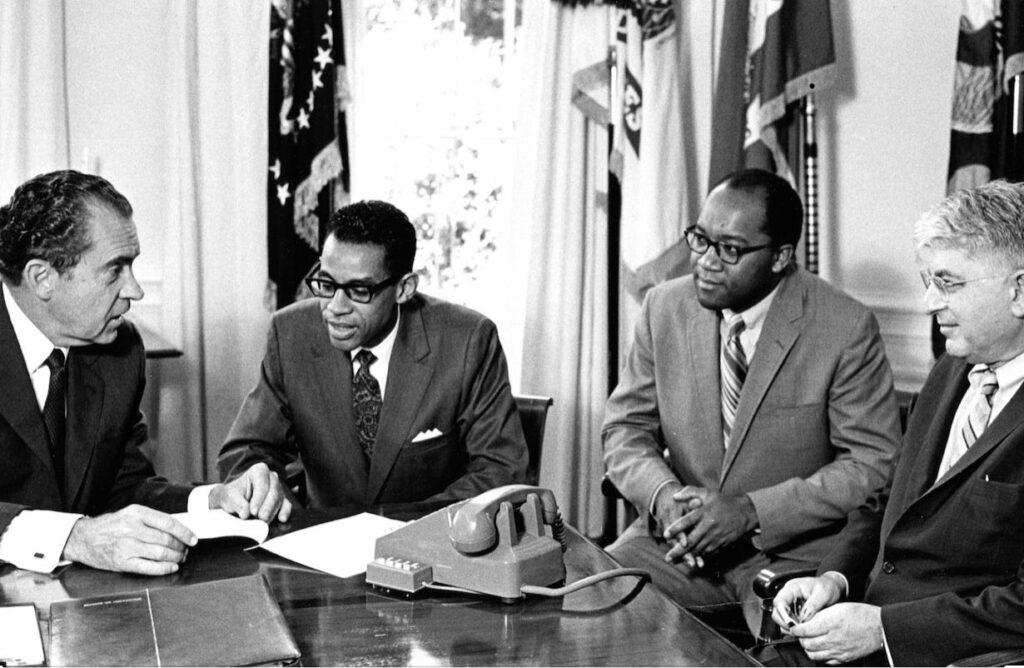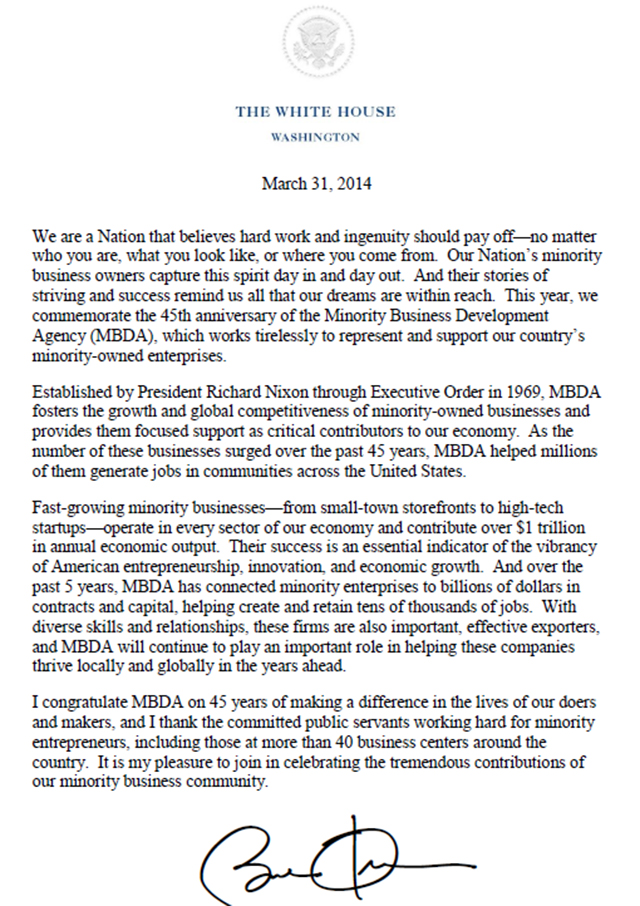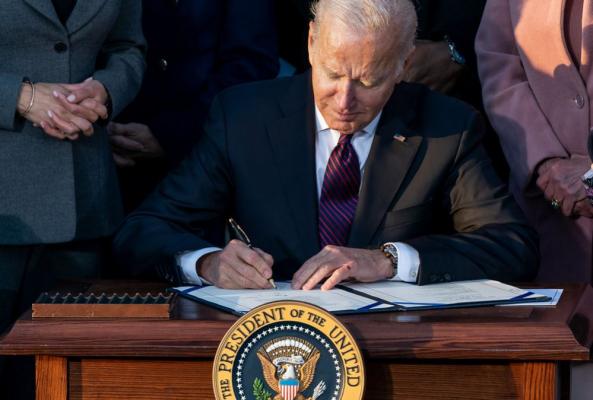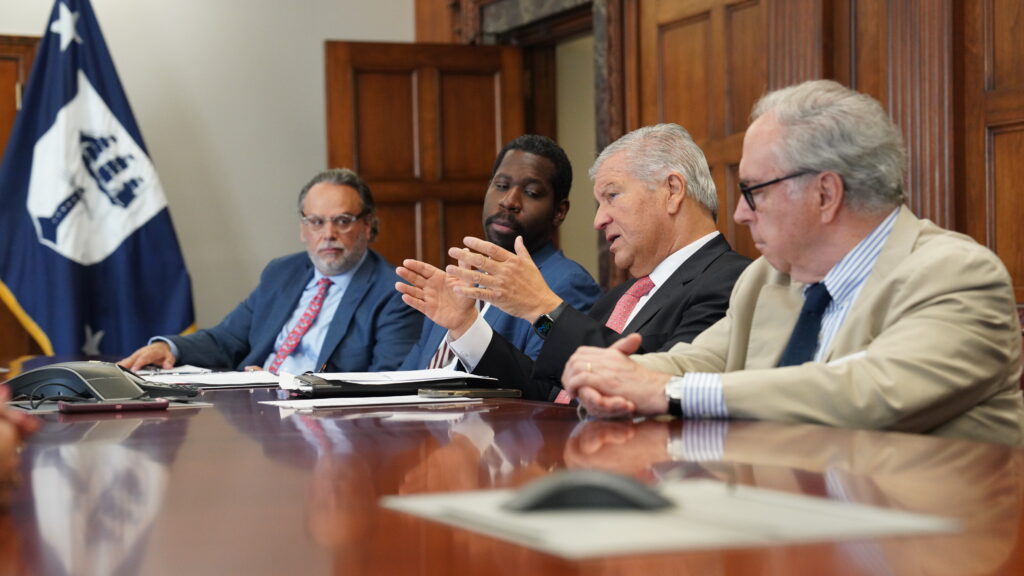In 1969, amid the social transformations following the Civil Rights Movement, Republican President Richard Nixon established the Office of Minority Business Enterprise—later renamed the Minority Business Development Agency (MBDA)—to promote economic empowerment for minority communities. Emphasizing the importance of full participation in the nation’s economy, Nixon declared: “We must move from tokenism to total involvement. Minority entrepreneurs must be full partners in America’s economic life.”

Subsequent Republican administrations continued to support and expand the agency’s mission. In 1982, President Ronald Reagan reaffirmed the federal commitment to minority business development, stating: “We reaffirm our commitment to a healthy economy in general and to a vibrant and expanding minority business opportunity in particular.” He further emphasized: “Successful minority enterprise is a major element of our economic recovery program.”
In the early 2000s, President George W. Bush praised the energy and innovation of small businesses, remarking: “Our small business sector is vibrant and strong because of the dreamers who live here in America. And the job of government is to inspire, is to help.” His administration partnered with organizations like the National Urban League to foster entrepreneurship in underserved communities, with the MBDA playing a central role.
Democratic presidents likewise advanced the MBDA’s mission. President Bill Clinton emphasized inclusion as a national imperative, famously saying: “This is America. There is no them; there’s only us.” His administration expanded procurement and capacity-building programs for minority-owned firms.
Under President Barack Obama, the MBDA achieved historic performance. In 2012, it helped minority businesses access nearly $4 billion in contracts and capital and supported the creation of almost 6,000 jobs. In celebrating the agency’s 45th anniversary, Obama affirmed: “Supporting the growth and global competitiveness of minority-owned businesses is a priority for the Department of Commerce and the Obama administration.”

A Period of Expansion and Impact
In 2021, the MBDA was granted permanent status through the Minority Business Development Act, a bipartisan measure signed into law by President Joe Biden. This historic legislation codified the agency for the first time in its history, giving it full statutory authority and expanding its reach and resources. The law passed with support from both Democratic and Republican lawmakers—underscoring the agency’s cross-party appeal. At the bill signing, President Biden stated:
“This agency is about closing the racial wealth gap — and giving every entrepreneur, no matter their background, a fair shot to build generational wealth. That’s what America is supposed to be about.”

During the Biden administration, I had the honor of serving as Counselor at the U.S. Department of Commerce, focusing on minority-owned business development and international programs for this segment. This included working with the leadership of the agency on initiatives such as the Capital Access Summit, the Procurement Summit, and expanding access to international contracts and markets. Among those efforts was the signing of a Memorandum of Understanding with FEBICHAM, the federation of binational chambers of commerce representing the most relevant Latino diasporas in the U.S., and collaboration with the International Trade Administration (ITA) on a trade mission to the Caribbean.
I also had the privilege of working hand in hand with the competent career staff of the agency and the entrepreneurial leadership of many of MBDA’s business and export centers. Their professionalism, mission-driven commitment, and deep understanding of the communities they serve were instrumental to the agency’s success and inspired confidence in its long-term impact.

Over the last four years, the MBDA delivered measurable results:
– Facilitated over $3.2 billion in contracts and $1.6 billion in capital for minority-owned businesses in 2024 alone
– Supported the creation or retention of more than 23,000 jobs
– Launched the Capital Readiness Program (CRP) in 2023—the largest technical assistance initiative in Commerce Department history—serving over 6,300 entrepreneurs, raising $263 million in capital, and helping launch 2,636 new businesses
– Expanded its network from 88 to 131 business centers, significantly increasing access in rural, tribal, and underserved communities
In addition, MBDA Export Centers played a key role in increasing global market access for minority businesses. In Fiscal Year 2023, the agency facilitated nearly $300 million in export transactions and supported the creation and retention of over 14,000 jobs. These centers provided targeted technical assistance to help minority-owned firms compete in international markets, strengthening U.S. trade competitiveness.
During the Biden administration The Nuziard litigation added legal complexity to the MBDA’s future. In Nuziard v. Minority Business Development Agency, plaintiffs challenged the agency’s race-conscious eligibility criteria, arguing that MBDA’s programs and services—targeted specifically to minority-owned businesses—violated the equal protection guarantees under the Constitution. The court ruled against the agency, and notably, the decision was not appealed by the Department of Commerce. Although the ruling limited the agency’s ability to use explicit race-based criteria, it did not exclude providing services to those ethnic minorities and other groups based on their self-assertion of the necessity of the agency’s support. The decision left space for mission continuity through more inclusive, race-neutral frameworks that still address entrenched disparities. At the leadership at the agency we viewed this moment not as a setback but as an opportunity. We chose to embrace compliance with the ruling’s terms rather than contest it in the courts, and in doing so, identified strategic pathways to expand the agency’s mandate. One key shift was to recognize rural America as a historically underserved and socioeconomically disadvantaged region, meriting inclusion in MBDA’s outreach and support. This pivot allowed us to broaden our mission while remaining aligned with the court’s guidance. Looking ahead, we envisioned working in bipartisan partnership with Congress to expand MBDA’s budget and capacity—so it could continue promoting inclusive economic growth and equity within a race-neutral, yet justice-oriented, framework.
Trump Administration Orders Dismantling
Despite its proven track record, the MBDA is now being targeted for elimination by the Trump administration. As part of a broader initiative to reduce the federal government’s footprint and curtail diversity-related programs, President Trump signed a March 2025 executive order directing the elimination of the MBDA “to the maximum extent consistent with applicable law.” Other agencies affected by the order include the Community Development Financial Institutions Fund and the U.S. Interagency Council on Homelessness.
According to a National Review report published on April 10th, 2025, the Commerce Department issued reduction-in-force notices to 32 MBDA employees in April 2025, following the placement of dozens more on administrative leave in March.
The administration’s rationale, driven by the Department of Government Efficiency (DOGE), centers on scaling back what it views as politically motivated DEI programs. Critics, however, argue that this approach ignores the MBDA’s statutory mandate, bipartisan origins, and real-world economic impact.
Some policy observers have suggested that, if the goal is greater efficiency, a more constructive alternative would be to integrate MBDA into the Small Business Administration (SBA) rather than dismantle it entirely. While no dedicated studies currently exist on such a merger, general research on public-sector reorganizations points to potential benefits—including operational streamlining, improved access to capital, and consolidated service delivery. However, experts caution that preserving MBDA’s specialized mission is essential to avoid diluting its impact on historically underserved minority business communities.
Political and Legal Backlash
The move has sparked significant backlash in Congress and beyond. Lawmakers, particularly from the Congressional Black, Hispanic, and Asian Pacific American caucuses, condemned the executive action as a violation of the MBDA’s legislated permanence.
During his confirmation hearing, Commerce Secretary Howard Lutnick was asked by Senator Lisa Blunt Rochester (D-DE) whether he would protect the MBDA. Lutnick responded, “I think it’s small, so it’s hard for it to be successful. It can be effective.” The remark drew criticism for understating the agency’s documented achievements and legal status.
Several members of Congress are exploring legislative remedies, while civil rights groups are preparing to challenge the administration in court, citing the MBDA’s codification under federal law.
A Historic Setback for Equity?
The MBDA is the only federal agency solely dedicated to the development of minority business enterprises. Its proposed dismantling is not just a bureaucratic maneuver—it represents a dramatic retreat from a 50-year commitment to economic inclusion.
From Nixon’s call for “total involvement,” to Reagan’s praise of “successful minority enterprise,” to bipartisan legislative action in 2021, the MBDA has consistently embodied the American promise of opportunity for all. Its potential elimination could undo years of progress in closing the racial wealth gap and limit pathways to entrepreneurship for historically disadvantaged communities.
The dismantling of the MBDA, in conjunction with the Trump administration’s broader executive order to eliminate diversity, equity, and inclusion (DEI) programs across all federal agencies, represents a sweeping rollback of institutional efforts to address systemic disparities. This dual action removes vital support for underserved entrepreneurs and dismantles the frameworks designed to ensure fair access to federal resources and opportunities.
DEI is not about division—it is a practical strategy to remove historical economic barriers, for creating opportunity, building wealth, and fostering entrepreneurship among historically and socioeconomically disadvantaged groups. Rather than perpetuating marginalized communities or marginalizing others, DEI initiatives expand participation, strengthen capitalism, and promote a more inclusive and resilient market economy. In doing so, they reinforce the foundations of economic democracy and the promise of equal opportunity that defines the American ideal.
Conclusion

The MBDA’s story—from its founding by a Republican president to its expansion under Democratic and Republican administrations, and now its targeting by a Republican-led executive order—illustrates the fragile fate of equity-focused government institutions in a polarized era.
Whether the agency survives will depend on the outcome of legal battles, congressional intervention, and public advocacy. More broadly, it will test whether the United States still upholds the principle that economic opportunity should be universal—not a privilege for the few, but a promise kept for all.
